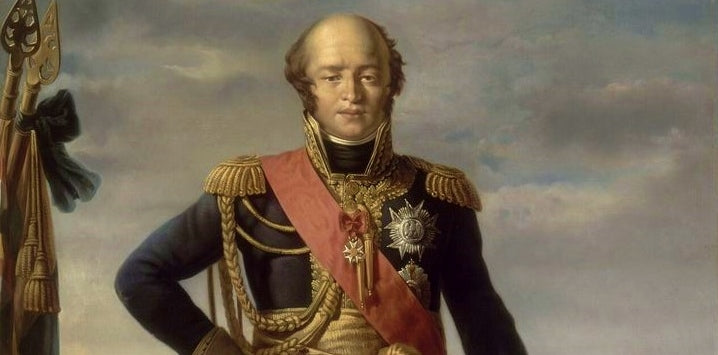Part two of our series features Davout, the Iron Marshal, one of Napoleon's most talented subordinates - some would say a greater battlefield commander than Napoleon himself.
Louis-Nicolas Davout (1770-1823), Prince of Eckmühl, Duke of Auerstedt
Nicknamed the Iron Marshal for his stern demeanour and his tenacious defence on the battlefield, Louis-Nicolas Davout is widely regarded as being among Napoleon’s most brilliant generals. Born into minor nobility in 1770, he was a junior officer at the outbreak of the French Revolution and embraced its principles. He was promoted to general of brigade following the Battle of Neerwinden in 1792, but was soon struck off the list of active generals on account of his noble birth.
By 1794 Davout was back on duty and served in Germany until 1797. He then served under Louis Desaix during the Egyptian Campaign, where he first came to Napoleon’s notice. After Napoleon came to power as First Consul, he was given a command in the consular guard. Davout was the youngest officer to be promoted to the rank of Marshal, created by Napoleon when he became Emperor in 1804. Davout's youth - and his talent - provoked jealousy among his fellow officers, and he had frosty relationships with most of his fellow marshals.
During the War of the Third Coalition Davout commanded III Corps which would occupy Vienna. Ordered to join Napoleon on the battlefield at Austerlitz, Davout led them on a forced march which saw them arrive on the eve of the battle. Anchoring the right flank of the Grande Armée at the villages of Telnitz and Sokolnitz, Davout and his men bore the brunt of the Austro-Russian army’s attacks. Although he was eventually compelled to fall back and surrender the villages, Davout managed to hold on long enough to allow Napoleon to order Marshal Soult to strike in the centre and win a glorious victory.
Davout’s greatest hour came on 14 October 1806. While Napoleon won an easy victory over the Prince von Hohenlohe at Jena, Davout’s corps of 26,000 men encountered the main Prussian force under the Duke of Brunswick at Auerstedt. Despite being outnumbered more than two-to-one, Davout managed to repulse all Prussian assaults, mortally wounding Brunswick in the process. The death of their commander caused Prussian morale to collapse, and Davout saw the opportunity to order a counter-attack to drive the enemy off the battlefield. In recognition for his great solo victory, Napoleon gave Davout the honour of leading his men into Berlin and made him Duke of Auerstedt. Davout would continue to serve with great distinction against the Russians at Eylau and Friedland. In 1809 his victory at the battle of Eckmühl against the Austrians won him the title Prince of Eckmühl.
During Napoleon’s ill-fated Russian campaign, Davout was given command of I Corps, some 70,000 men strong. Together with Jerome Bonaparte, Napoleon’s youngest brother and King of Westphalia, Davout was ordered to bring General Bagration’s Second Army to battle and defeat it before it could unite with the Russian First Army under Barclay de Tolly. Jerome and Davout fell out with each other and failed to seize the opportunity, allowing the Second Army to make its junction with the First at Smolensk. Davout then joined Napoleon’s main force and his men were among the first in action at Borodino, attacking Prince Bagration's men on the Russian left. During the retreat from Moscow he was given command of the rearguard and was defeated at Krasnoi, where his Marshal’s baton was captured by Cossacks.
During the War of the Sixth Coalition Davout was placed in command of the garrison at Hamburg. While he once again demonstrated his tenacity by successfully defending the city until after Napoleon had already abdicated, this meant that Napoleon was deprived of his most talented subordinate during the campaigns of 1813-14. When Napoleon returned from exile in 1815, Davout immediately joined him and was appointed Minister of War. Napoleon believed that it was essential for Davout to stay in Paris to manage the logistical aspects of the war effort which deprived him of the opportunity to fight at the Battle of Waterloo. Following Napoleon’s defeat he was prepared to make a last stand in Paris but was asked to surrender by the new government. He eventually reconciled with the Bourbon regime and died in 1823.
Check out our Marshal Davout matryoshka mug




Share and get 15% off!
Simply share this product on one of the following social networks and you will unlock 15% off!